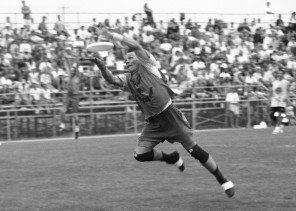
Ken Dobyns pulls in a disc at the World Ultimate Club Championship final for New York versus Double Happiness. Madison, USA. 1993 (Photo by Toby Green)
I first came to love ultimate one Saturday evening in 1995, sitting in a cafeteria in Amherst, MA. My high school team had just competed in its first big tournament, and now we were sharing a meal with our opponents. As we ate lasagna, someone wheeled out a television and played videos of Kenny Dobyns talking about how ultimate was more important than girlfriends or God. We diagrammed plays on napkins. We gawked across the room at the twin brothers from Scarsdale – “the best high school players in the country,” someone whispered – whom we would face in semifinals the next morning. The room was buzzing with talk of cup zones and clams and i-o flicks. I was in the company of athletes from all around the country who had discovered the same amazing secret I had, and together we made up an underground universe.
Three months earlier, I had nearly given up on sports. The problem had not been a lack of talent or inclination. I loved releasing a jump shot and knowing it would go in as soon as it left my fingers; I loved cradling a lacrosse ball and sprinting painless through the bruising stick checks and body checks of a tight defense. What I did not love was participating in a culture of jocks. There was a whole caste of guys who couldn’t feel good unless they were putting someone down. What’s worse, they were surrounded by a sub-caste of fake jocks, who felt compelled to feign enthusiasm when the jocks talked shit about how much someone sucked. The other team, for example, always sucked. Basketball and lacrosse were hardly to blame for the narcissism of teenage boys, but they became conduits for it all the same. To compete was to impose your ego on someone else.
Ultimate was different. It aspired to a higher ideal of competition. That day in Amherst, we played because it was fun – and we played hard because we wanted respect, and we played fair because we wanted self-respect. When our opponents made huge plays, we thought it was awesome, because they inspired us to rise and meet their challenge. There was no coach telling us to think like this. There was merely the Spirit of the Game, and the fact that, if we didn’t use it, the game wouldn’t work and we wouldn’t be able to look our opponents in the eye later that night as we ate our lasagna. Ultimate was different: not because it emphasized sportsmanship – which is an ancient thing compared to our young sport – but because ultimate couldn’t function without it.
Lots of people are trying to change this nowadays. They might say they aren’t, but they are. They might not realize it, but they’re doing it all the same. They love ultimate so much that they want everyone else to know how great it is, so they’re trying to make it marketable. They want to put us in promotional videos and shop us to cable networks; they’re trying to gain fans and sell tickets; they’re trying to monetize our play.
I know where they’re coming from. I love playing in front of crowds. And of all the great plays I’ve made, only a couple have been captured on video, though I’m sure more than a few were good enough for SportsCenter. I’ve also spent thousands of dollars playing 11 club seasons. If someone offered to fill a stadium with fans to cheer me on, and put me on TV, and pay me for doing what I already love, I’d hardly complain. Promoting the sport: it’s a noble goal, and I support it.
But should it be our biggest goal? Should we change the game to achieve it?
**
Through the history of our sport, we’ve been guided by a north star first identified by a bunch of high school kids in 1968: the search for the ultimate competitive experience. I can draw a straight line from the vision those kids developed in a New Jersey parking lot, and trace it across three decades, to the joy I felt on the fields of Amherst; and I can extend that line through another decade and more, to the feeling I’ve had in Sarasota, making a diving catch past my rival, and then getting skied by him, and then seeing him at the Daiquiri Deck on Saturday night and giving him a hug – and really meaning it. (I am referring, of course, to Brian Stout: that guy can jump through the roof and give great hugs.)
What we love about ultimate is only partly a function of the structure of the game and the way discs fly. Plenty of other sports can give you the visceral thrills of playmaking, effortless flow, and being in the zone. What makes ultimate different is the ethos that has grown around it. There’s a reason Howard Cosell famously called our sport “a refreshing reminder of what sport was meant to be and still, on rare occasions, can be.” That’s the part of the quote that is most often printed on t-shirts and discs, but what he said right before that should also be instructive: “The ultimate reward for their time? Nothing. Nothing, save the joy of competition.”
That’s my goal for our sport: joy of competition. And for anyone else who wants to push our sport to evolve, I would ask: what is your highest goal? Are you dedicated to helping promote the joy of competition? Or are you interested first in selling a product? An evangelist of the so-called professional leagues might tell you he aspires to both of these goals at the same time. But anyone who says this marks himself as a person rich in ambition but poor in either wisdom or honesty. As any good leader has learned, you can’t have two primary goals.
Great competition and marketability are complementary perhaps 80% of the time, but when push comes to shove, the “pro” leagues exist to make money. I’m not against for-profit businesses, but I am also not naïve about their priorities. Look at the compromises that the MLU and AUDL have already made: they have changed the field, to conform to the dimensions of football, and they have put referees on it, to conform to the expectations of prospective fans. The MLU has even taken Ultrastars out of their players’ hands and replaced them with Innovas, presumably because that was the highest bidder. The cart is hitched in front of the horse.
I expect the competition will still be joyful, at least for a while. My friends who played in the AUDL last season said the games were really fun, and even cited examples of times when players rejected incorrect referee calls that had gone in their favor. “See?” they said, “it’s still ultimate.” But they weren’t quite right. The sport they were playing was now a for-profit business, which was evident in how the season ended. Various franchises began to disagree about how the league might expand, and in a stroke of high irony, the organization that had done away with self-officiating imploded as the owners failed at dispute resolution. If everyone had been dedicated primarily to the pursuit of great competition, one could hardly imagine such an issue would threaten the life of a season. But, alas, business came first.
Not that this will happen again. The leagues are being run and promoted by talented people with good money behind them, and they’re sure to learn from past mistakes. Already this winter they’ve attracted a much larger crop of great players. “Pro” games will be exciting; they’ll look and feel quite a lot like ultimate; and I predict that at least one league will succeed at making some money and promoting its version of the sport. The MLU and AUDL have the real potential to achieve at least some of their goals – and that’s a problem, because they have set their course using a faulty compass.
**
At a recent conference for ultimate players in Boston, speaking on a panel discussing the future of ultimate, Brodie Smith clearly and forcefully advocated for the AUDL vision of ultimate. I respect him, and not just because one of his YouTube videos taught me how to add 10 yards to my forehand huck. Brodie knows what he stands for, and he has the passion to promote it. The sport is evolving, he argued, and if an elite group wants to professionalize then that should hardly stop everyone else from enjoying the game on their own terms. The NBA doesn’t use the same rules as a bunch of guys playing pickup basketball in the park; what’s the big deal if ultimate follows suit? Moreover, if we make ultimate more marketable, we’ll increase our fan base and attract prospective players. The sport grows. We all win. Brodie made some compelling points up in Boston, and my respect for him is matched only by the extent to which I believe he is wrong. I stood up and said so then, and I’m saying so now.
There will be a price to pay. What happens at the highest level of our sport has an enormous ripple effect throughout the world of ultimate. High school and college teams look to us – the best players and coaches in the game – and they learn new defenses, new footwork drills, new leadership techniques. They want to know what it takes and what it means to be a winner in ultimate, and we set the gold standard. If we come unhitched from our north star, our sport will change in subtle and pervasive ways. We’ll become accustomed to pulling at jerseys in the stack when the ref isn’t watching; more and more, we’ll play according to what we can get away with rather than what’s fair. We might not see it this year or next, but a decade from now, a high school team will gather for dinner after a tournament, and they’ll talk about how much the other team sucked, and how much the ref sucked for blowing those calls – and on the edges of that conversation, a 14-year-old kid will give up on sports.
You might call me alarmist, but my point is simply that we cannot change our goals without changing ourselves. You might also accuse me of romanticizing the status quo, but I believe we have something valuable to protect. Over the past decade, I’ve suited up alongside hundreds of athletes every October and together we’ve pushed the game a little closer to the ideal form of what it can be. That’s why I love Nationals so much. We’re all trying to beat the shit out of each other, but the competition makes us better, and the teams that make it to quarters and semis are forged into something they never could have become before we all went through that fire. When we raise our glasses at the end of the tournament, there’s a feeling of camaraderie, because together we’ve done something fucking awesome. We don’t need anyone else to agree. And when we model that kind of self-respect, it matters. I’ve coached the best youth players in the country, and I can tell you for a fact: they’re watching.
The problem with the MLU and AUDL is not their ambition, it’s their poverty of imagination. Their first failure is to assume that the best way to define a league’s success is by the metrics of profit that drive the NBA and NFL. We could just as easily professionalize ultimate as a series of teams, incorporated as nonprofit organizations, that work collectively to form a league whose highest goal would be to showcase “the ultimate form of athletic competition.” (This is similar to what Kevin Minderhout envisioned with his proposed NexGen league; I can also imagine the USAU’s Triple Crown Tour evolving in this direction.) Such an organization would still have to worry about revenues, sponsors, corporate partners, and other economic pressures that might be in tension with the purity of sport; but this league would not be required, as a matter of fiduciary duty to investors, to prioritize the business above the game. We would be less likely to compromise our competitive ideals.
We would also protect ourselves from the blinkered vision of a few people with access to money. Decision-making in the MLU and AUDL rests with the owners, who evidently assume that to market ultimate, we have to make it more like other sports. But as Ben Wiggins has eloquently argued, the player-controlled nature of the game is a unique feature that could conceivably distinguish ultimate from the NBA and NFL – leagues which (let’s face it) feature a caliber of athlete that ultimate has not yet produced. If we’re just trying to be another “big play” sport, then we’re going to have a hard time competing with LeBron and RGIII for airtime. So what makes us unique? Is there a demand for professional athletes who value pure competition above profit? Can we market the Spirit of the Game? I think so. We sure shouldn’t give up without trying.
Instead, however, the MLU and AUDL have embarked on a social media-driven marketing campaign that, at its worst, amounts to a glossy enactment of a group inferiority complex. In clip after clip on YouTube, I watch an interviewer ask what it means to be a professional athlete, and my friends give canned answers without once acknowledging that they aren’t being paid enough to qualify as one. The unspoken reality is that neither the MLU nor the AUDL is actually a professional league; the players are being lightly subsidized by investor capital. It would be more accurate to call it “subsidized elite ultimate,” or perhaps “sub-elite ultimate” for short. I don’t blame my friends for pretending otherwise: if you put a camera in my face, I’d also let the interviewer lead me to the expected response. But I cringe all the same. I know and respect these guys, and they have good intentions, but they aren’t being themselves. This isn’t us.
**
“This isn’t us” is a sentiment that many of us have been feeling these days, but too few have been saying it aloud. We see gauzy soft-focus videos from a pro team combine posted on Facebook, and we see that our friends are really excited about their new team, so we click “like” and tell them congratulations on your contract. Nobody likes a wet blanket. We get invited to tryouts, and we feel a little weird about this whole pro ultimate thing, but we say “why not?” And hey – it turns out that this feels a lot like ultimate, so how bad can it be? From such pure motives, I might sign a contract myself, without even pausing to ask what I’m signing up for, or what I’m signing away. Collectively we shrug and say, “I guess that’s just the direction ultimate is heading.”
It doesn’t have to be. In their infancy, the MLU and AUDL can only survive on the enthusiasm of their participants and their fans, all of whom come from the world of ultimate. Collectively, we have control. And all of us have the power to say, “This isn’t us.” We don’t need to risk our friendships to say it, if we speak with respect. I love my New York teammates who are signing contracts with the Rumble and the Empire – I love them so much that I am willing to tell them I think they’re making a mistake. They are joining organizations that treat as secondary the ideals of competition that have formed the foundation of our shared experiences. This is why, when I’ve been asked to join some of the pro teams, I’ve declined. This is why, if I’m invited to support these leagues with my attendance, I’ll decline. We can all respectfully decline.
Some of my friends disagree with me. Like Brodie, they simply want to take ultimate in a different direction – and if their eyes are clear and they believe passionately in what they’re doing, then I respect them. But as their friend, I will also tell them with even greater passion that I believe we can do better. When we are at our best, we don’t give a shit that most people don’t understand what we train for. Winning Nationals doesn’t mean something because there’s a crowd watching or an endorsement deal on the line; it means something because we, and our opponents, make it mean something. We know that if ultimate is obscure, then this is less a knock on our sport than a sign that the world is not sufficiently advanced. We have the balls to be ourselves.
I’m not suggesting for a minute that we should be content to labor in obscurity – I’m arguing that we should expand the scope of our imagination and ambition. What if, instead of changing ultimate in order to sell it to the world, we use our sport to change the way the world thinks about competition?
Imagine a future in which ultimate stadiums are filled to capacity because – as James Earl Jones argued in “Field of Dreams” – people are hungry for an experience of sport that reminds us of all that was once good, and that could be again. Yes, people will come: they’ll come because they themselves have played and loved the game. They have raced for a floating disc, and then sat in high school cafeterias with their friends and opponents – and they know their heroes competing there under the lights will be breaking bread together tonight, right after they finish trying to beat each other. On this future day, the players in those stadiums will owe their professional status not to the MLU and AUDL pioneers who once chased ersatz glory, but to the coaches and organizers working right now to create a larger universe of life-long players and fans. This is a goal worthy of our efforts. Anything less just isn’t ultimate.
Feature Photo by Jeff Bell – UltiPhotos.com
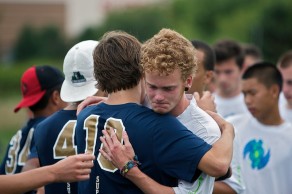
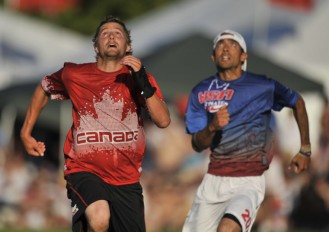
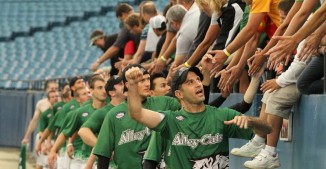
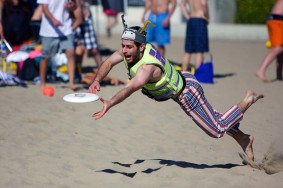
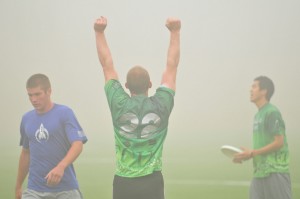





Comments Policy: At Skyd, we value all legitimate contributions to the discussion of ultimate. However, please ensure your input is respectful. Hateful, slanderous, or disrespectful comments will be deleted. For grammatical, factual, and typographic errors, instead of leaving a comment, please e-mail our editors directly at editors [at] skydmagazine.com.